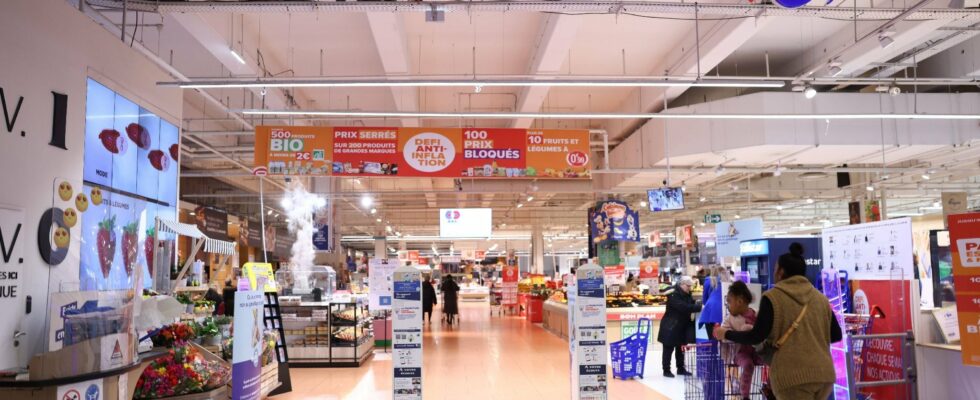Is Carrefour, which denies this, imposing too unbalanced a relationship on its franchisees? This is the opinion of some of them, who took him to court, but also of the Ministry of the Economy, which recommends a fine of 200 million euros, causing the distributor’s stock price to plummet this year. Tuesday June 18.
Contractual conditions “so obviously unbalanced to the detriment of franchisees” that it can only result “from their submission to these obligations”: the “conclusions of voluntary intervention” of the services of the Ministry of the Economy, revealed Tuesday by the media The letter and which AFP was able to consult, are very critical of Carrefour.
The latter’s practices are, according to the 160-page document, “characteristic of restrictive competition practices” and “consist very concretely of suffocating franchisees by using a position of strength”. The group challenged Bercy’s conclusions to the AFP. After the revelation of the information, the action of the only distributor of the CAC 40, however, fell by more than 9%, even reaching its lowest since November 2020, at 13.14 euros, before slightly reducing its losses.
Association of disgruntled franchisees
The Ministry of the Economy, which is based in particular on a survey carried out by the Regional Directorate of the Economy, Employment, Labor and Solidarity (DREETS) of Normandy between July 2019 and March 2022, issued these conclusions as part of a summons emanating from an “association of Carrefour franchisees”, which brings together managers of dissatisfied franchise stores, and filed before the Rennes court.
Bercy notes, in the contracts between Carrefour and its franchisees, “numerous obligations” which are “out of proportion with the usual operating rules of a franchise”. Distributors are increasingly relying on the deployment of franchise stores, a model in which independent traders pay a fee to use the name of the brand, and obtain their supplies from the distributor’s purchasing center.
This allows Carrefour, Casino (Monoprix, Franprix, etc.) or even Auchan to maintain or increase their sales area, without incurring numerous store operating costs, salaries or investments for example. Differences exist, however, with a competitor having recently assured AFP that its own model left “much more autonomy to its franchisees than that of Carrefour” for example.
Assignments
For Bercy, Carrefour’s practices “are contrary to economic public order and justify the imposition of a civil fine” in the amount of 200 million euros. The Ministry of the Economy also recommends that the injunction to cease illegal practices be accompanied by a penalty of 50,000 euros per day of delay from the notification of the judgment to be pronounced by the Rennes court.
These conclusions do not prejudge the decision of this court, which should not be made for several months, according to a person familiar with the case who requested anonymity. Franchising is in any case a pillar of the strategy of Carrefour CEO Alexandre Bompard, who has given it an ever-increasing place in the company’s model since his arrival in 2017.
In France, the No. 2 in the supermarket sector behind E.Leclerc continues to open small format stores, called convenience stores, and also converts larger stores, hypermarkets and supermarkets, into rental management, a variant of the franchise in which Carrefour remains the owner of the business.
This practice is, however, contested by the distributor’s unions, who see it as an outsourcing of stores and employees, more than 23,000 to date, according to the CFDT, whose services branch has also taken Carrefour to court “for abusive rental practices -management and franchise”. Alexandre Bompard recently defended this policy allowing Carrefour not to close stores, in an “extraordinarily difficult” context under “competitive pressure” from discount specialists, such as Lidl or Action, and networks of “independent” stores, E .Leclerc, Intermarché, Coopérative U, “whose social model has nothing to do with ours”.
